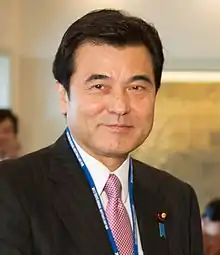Koriki Jojima
Koriki Jojima (城島光力, Jōjima Kōriki, 1 January 1947) is a Japanese politician who served four terms in the House of Representatives and was Minister of Finance from 1 October to 26 December 2012.
Koriki Jojima | |
|---|---|
城島 光力 | |
 | |
| 74th Minister of Finance | |
| In office 1 October 2012 – 26 December 2012 | |
| Prime Minister | Yoshihiko Noda |
| Preceded by | Jun Azumi |
| Succeeded by | Tarō Asō |
| Personal details | |
| Born | Jōjima Masamitsu 1 January 1947 Yanagawa, Fukuoka, Japan |
| Political party | New Frontier Party (formerly) Democratic Party |
| Alma mater | University of Tokyo |
| Website | www |
Early life and education
Jojima was born in Yanagawa, Fukuoka, on 1 January 1947.[1][2] He is a graduate of Faculty of Agriculture at the University of Tokyo.[1] He received a bachelor's degree in agronomy in March 1970.[3]
Career
Jojima is the former head of Ajinomoto Workers' Union where he served for about 25 years[4] and also, of Japan Food Industry Workers' Union Council.[1] He then served as a council member of the Japan Productivity Center for Socio-Economic Development.[1] He is a veteran lawmaker.[5] He was first elected to the House of Representatives in 1996 as the number one candidate for the New Frontier Party in the multi-member Tokyo proportional representation block.[2]
Following the dissolution of the New Frontier Party in 1997, Jojima became one of the founding members of the Democratic Party of Japan (DPJ) in 1998.[6] At the 2000 general election he unsuccessfully contested the Tokyo 13th district but retained his seat in the PR block as the DPJ's #2 candidate. In the next election in 2003, he won the Tokyo 13th district, defeating incumbent Ichirō Kamoshita by 2,023 votes. In the 2005 election, Kamoshita regained the seat, defeating Jojima by more than 49,000 votes. This heavy defeat also meant that Jojima was unable to retain a seat in the Diet via the proportional representation block. Jojima returned to the Diet in the 2009 general election, this time contesting the Kanagawa 10th district.
Whilst in the Diet, Jojima served as the parliament affairs chief of the DPJ.[7] He was also a member of committee on fundamental national policies.[1] He was appointed finance minister in a cabinet reshuffle on 1 October 2012, replacing Jun Azumi in the post.[6][8] It was his first cabinet post.[9] Jojima served in the cabinet led by Prime Minister Yoshihiko Noda[2] until 26 December 2012, and he was replaced by Tarō Asō as finance minister.[10]
At the December 2012 general election, Jojima suffered a defeat at the hands of Kazunori Tanaka, losing by more than 43,000 votes and failing to gain a seat via the Southern Kanto proportional representation block.[11][12]
Views
Jojima is known to be a supporter of strong middle class in a society, and he does not endorse excessive competition.[13]
Personal life
His real name is Masamitsu.[4] But, he changed his name as "Koriki" after losing in the 2005 House of Representatives election to make a new start.[4]
References
- "Diet Members". DPJ. Archived from the original on 21 April 2012. Retrieved 1 October 2012.
- "Profile - Japanese Finance Minister Koriki Jojima". CNBC. 9 October 2013. Retrieved 24 January 2014.
- "The Cabinet". Kantei. Retrieved 25 December 2012.
- "Profiles of ten new ministers in Noda's Reshuffled Cabinet". The Yomiuri Shimbun. 3 October 2012. Retrieved 9 October 2012.
- Tetsushi Kajimoto (1 October 2012). "New Japanese finance minister seen sticking to policy line". The Star Online. Tokyo. Reuters. Retrieved 1 October 2012.
- Mayumi Otsuma; Isabel Reynolds (1 October 2012). "Jojima Named Finance Chief as Noda Sets Pre-Election Cabinet". Business Week. Archived from the original on 18 January 2013. Retrieved 1 October 2012.
- "Japanese Cabinet Reshuffled; Koriki Jojima New Finance Minister". RTT News. 1 October 2012. Retrieved 1 October 2012.
- "List of Ministers". Kantei. Retrieved 4 October 2012.
- "Noda adds new faces to Cabinet". The Yomiuri Shimbun. 2 October 2012. Retrieved 9 October 2012.
- "Japan's Abe taps allies for cabinet, eyes deflation". Reuters. 26 December 2012. Retrieved 26 December 2012.
- Nothing left for the election-gutted DPJ to do but rebuild Japan Times 18 December 2012
- Kana Inagaki (17 December 2012). "Japanese Election: The Biggest Losers". The Wall Street Journal. Retrieved 1 January 2013.
- "Standouts of Japan's new cabinet lineup". Asia One News. AFP. 1 October 2012. Retrieved 1 October 2012.